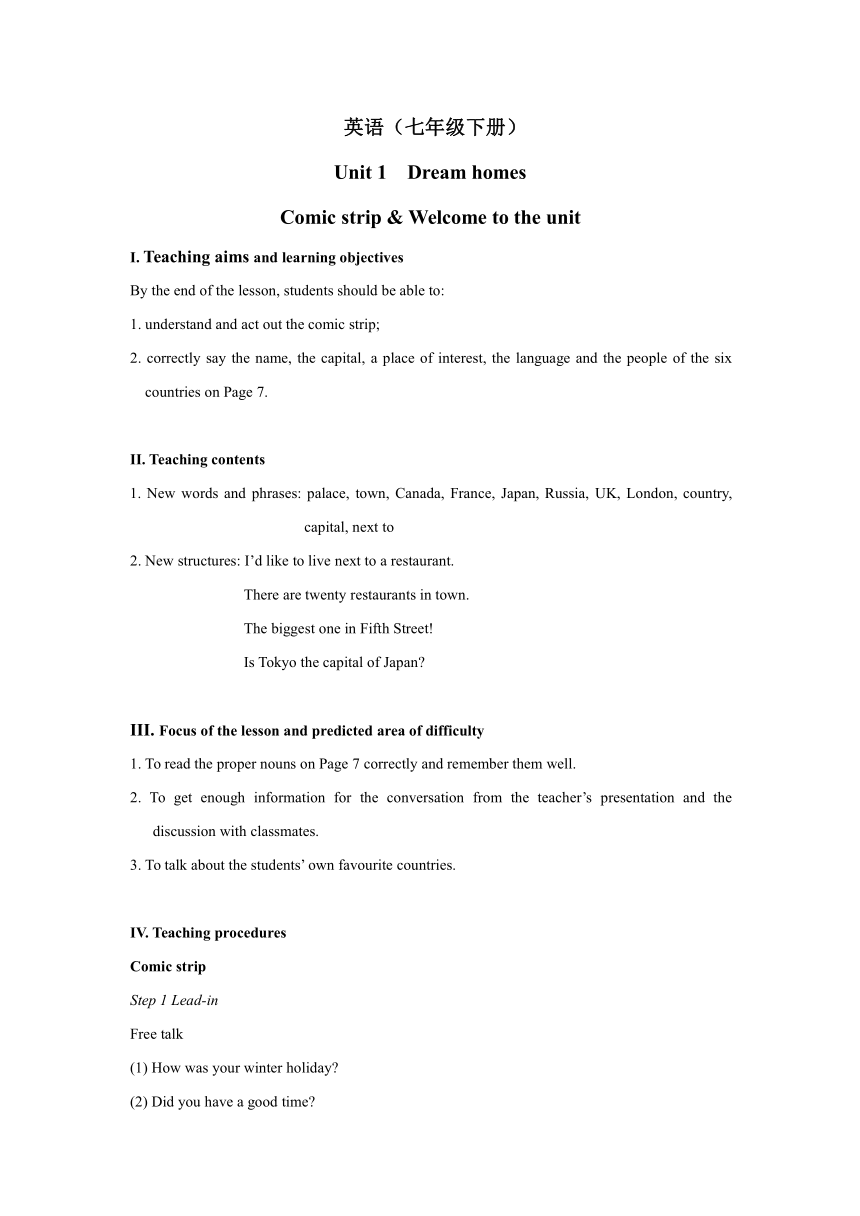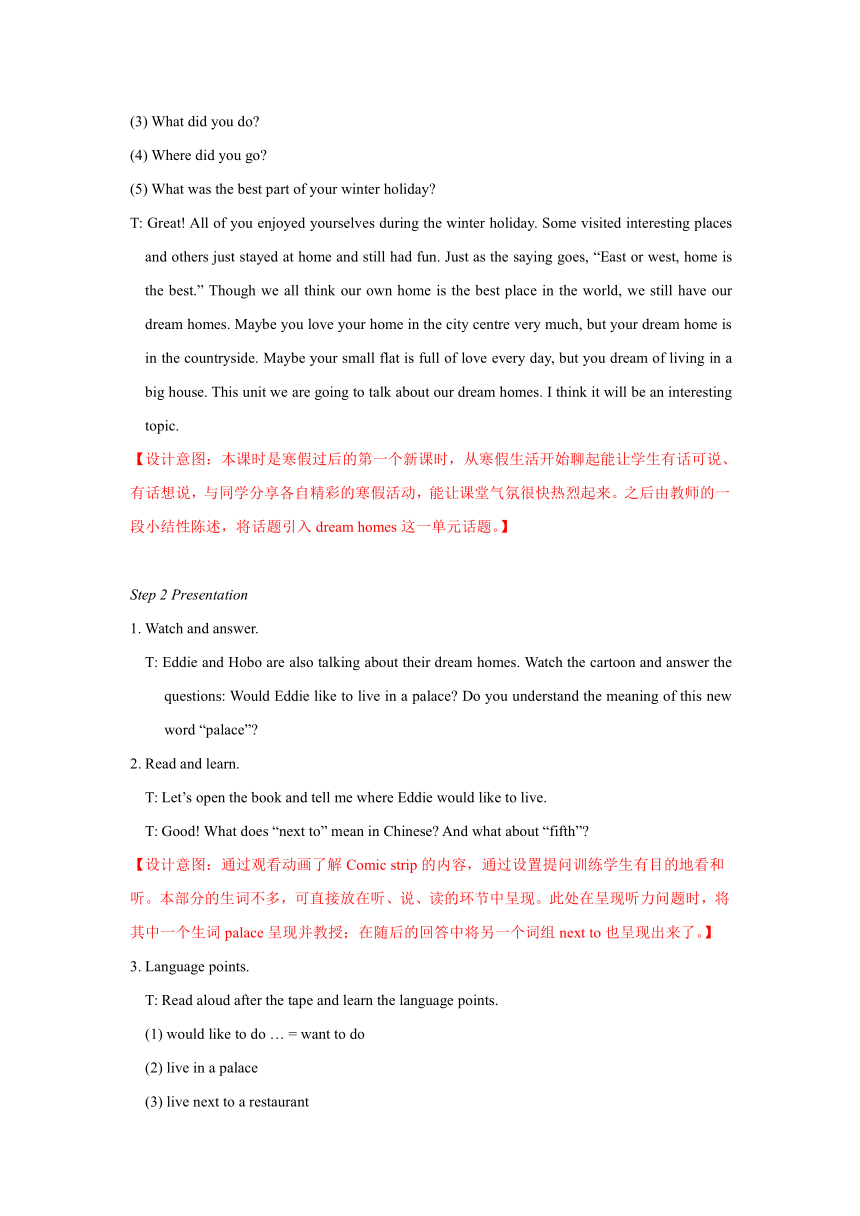Unit 1 Dream homes Comic strip & Welcome to the unit 教案
文档属性
| 名称 | Unit 1 Dream homes Comic strip & Welcome to the unit 教案 |  | |
| 格式 | zip | ||
| 文件大小 | 10.7KB | ||
| 资源类型 | 教案 | ||
| 版本资源 | 牛津译林版 | ||
| 科目 | 英语 | ||
| 更新时间 | 2020-05-31 11:11:12 | ||
图片预览


文档简介
英语(七年级下册)
Unit
1
Dream
homes
Comic
strip
&
Welcome
to
the
unit
I.
Teaching
aims
and
learning
objectives
By
the
end
of
the
lesson,
students
should
be
able
to:
1.
understand
and
act
out
the
comic
strip;
2.
correctly
say
the
name,
the
capital,
a
place
of
interest,
the
language
and
the
people
of
the
six
countries
on
Page
7.
II.
Teaching
contents
1.
New
words
and
phrases:
palace,
town,
Canada,
France,
Japan,
Russia,
UK,
London,
country,
capital,
next
to
2.
New
structures:
I’d
like
to
live
next
to
a
restaurant.
There
are
twenty
restaurants
in
town.
The
biggest
one
in
Fifth
Street!
Is
Tokyo
the
capital
of
Japan?
III.
Focus
of
the
lesson
and
predicted
area
of
difficulty
1.
To
read
the
proper
nouns
on
Page
7
correctly
and
remember
them
well.
2.
To
get
enough
information
for
the
conversation
from
the
teacher’s
presentation
and
the
discussion
with
classmates.
3.
To
talk
about
the
students’
own
favourite
countries.
IV.
Teaching
procedures
Comic
strip
Step
1
Lead-in
Free
talk
(1)
How
was
your
winter
holiday?
(2)
Did
you
have
a
good
time?
(3)
What
did
you
do?
(4)
Where
did
you
go?
(5)
What
was
the
best
part
of
your
winter
holiday?
T:
Great!
All
of
you
enjoyed
yourselves
during
the
winter
holiday.
Some
visited
interesting
places
and
others
just
stayed
at
home
and
still
had
fun.
Just
as
the
saying
goes,
“East
or
west,
home
is
the
best.”
Though
we
all
think
our
own
home
is
the
best
place
in
the
world,
we
still
have
our
dream
homes.
Maybe
you
love
your
home
in
the
city
centre
very
much,
but
your
dream
home
is
in
the
countryside.
Maybe
your
small
flat
is
full
of
love
every
day,
but
you
dream
of
living
in
a
big
house.
This
unit
we
are
going
to
talk
about
our
dream
homes.
I
think
it
will
be
an
interesting
topic.
【设计意图:本课时是寒假过后的第一个新课时,从寒假生活开始聊起能让学生有话可说、有话想说,与同学分享各自精彩的寒假活动,能让课堂气氛很快热烈起来。之后由教师的一段小结性陈述,将话题引入dream
homes这一单元话题。】
Step
2
Presentation
1.
Watch
and
answer.
T:
Eddie
and
Hobo
are
also
talking
about
their
dream
homes.
Watch
the
cartoon
and
answer
the
questions:
Would
Eddie
like
to
live
in
a
palace?
Do
you
understand
the
meaning
of
this
new
word
“palace”?
2.
Read
and
learn.
T:
Let’s
open
the
book
and
tell
me
where
Eddie
would
like
to
live.
T:
Good!
What
does
“next
to”
mean
in
Chinese?
And
what
about
“fifth”?
【设计意图:通过观看动画了解Comic
strip的内容,通过设置提问训练学生有目的地看和听。本部分的生词不多,可直接放在听、说、读的环节中呈现。此处在呈现听力问题时,将其中一个生词palace呈现并教授;在随后的回答中将另一个词组next
to也呈现出来了。】
3.
Language
points.
T:
Read
aloud
after
the
tape
and
learn
the
language
points.
(1)
would
like
to
do
…
=
want
to
do
(2)
live
in
a
palace
(3)
live
next
to
a
restaurant
(4)
in
town
(5)
the
biggest
one
in
Fifth
Street
【设计意图:帮助学生学习使用一些重要的句型和词组,并引入本单元Grammar部分将会讲到的基数词和序数词的概念,为之后的教学做铺垫。】
Step
3
Practice
1.
Play
roles
and
practise
in
pairs.
T:
Work
in
pairs
and
act
out
the
story.
I’ll
ask
some
pairs
to
act
in
front
of
the
class.
2.
Complete
a
short
story.
【设计意图:从展示隐去文字的PPT,让学生分角色朗读,到两人一组表演对话,再到以缺词填空的形式出现的对话内容重现。是一系列有铺垫、有层次的活动任务。帮助学生记忆所学内容,并灵活运用所学内容,同时表演也能激发学生的学习热情及兴趣。】
Welcome
to
the
unit
Step
1
Part
A
1.
Presentation
and
learn.
Show
pictures
to
learn
about
different
countries:
Japan,
the
USA,
France,
Canada,
the
UK
and
Russia.
Japan
T:
Boys
and
girls,
please
look
at
the
picture.
Who
knows
the
name
of
this
place?
T:
Yes,
it’s
Mount
Fuji.
There
is
thick
white
snow
at
the
top
of
the
mountain
all
year
round.
The
view
in
and
around
this
mountain
is
really
wonderful.
Do
you
know
which
country
it
is
in?
T:
That’s
right.
It’s
in
Japan.
Mount
Fuji
is
near
Tokyo,
the
capital
of
Japan.
Do
you
understand
the
meaning
of
“capital”?
T:
What
do
we
call
the
people
who
live
in
Japan?
Yes,
we
call
them
Japanese
or
Japanese
people.
And
“Japanese”
also
means
the
language
that
Japanese
people
speak.
T:
We’ve
learnt
something
about
Japan.
Would
you
please
say
something
about
this
picture
or
this
country?
For
example,
the
capital
of
Japan
is
Tokyo.
Who’d
like
to
go
on?
T:
Good
job!
So
much
for
this
picture.
Now,
look
at
the
next
picture.
2.
Look
and
match.
Finish
Part
A
on
Page
7.
3.
Complete
and
say.
T:
We’ve
learnt
a
lot
about
different
countries.
Let
me
help
you
remember
them
well.
Look
at
this
table.
First,
would
you
please
complete
it?
T:
Would
you
please
say
several
sentences
about
each
country?
You
can
first
practise
with
your
partner.
Then
I’ll
ask
some
of
you
to
report
one
of
them
to
the
class.
【设计意图:本课时的生词主要是国家、城市和名胜等专有名词,学生较难记忆和掌握。教师设计了三个步骤帮助学生认读这些内容:一、以图片的形式展示该国的名胜,以问题诱导的方式呈现国家、首都、语言、人民、名胜等信息,注意重点教授读音;二、每学完一个国家就要求学生每人说一句相关的话,在练习中进一步熟悉所学内容;三、在六个国家全部学完后,以表格的形式帮助学生进一步巩固,要求学生以一段话来描述一个国家相关的内容。从“词”到“句”,再到“段”,逐步提高要求,既实现了大量操练,又避免了机械重复。】
Step
2
Part
B
1.
Listen
and
answer.
(1)
Which
picture
are
Annie
and
Simon
talking
about?
(2)
What
do
you
know
from
their
conversation?
2.
Read
aloud.
3.
Make
up
similar
conversations.
【设计意图:此部分内容比较简单,让学生通过听、读和对话,进一步熟练上一步骤中所学的内容,为下一步提高性活动做好铺垫和准备。】
Step
3
Practice
Show
pictures
of
famous
people
from
the
six
countries
and
ask
the
students
to
do
the
question
chains.
Vote
for
the
best
question
and
the
best
answer.
T:
I’ll
show
you
some
famous
people
from
the
six
countries.
Let’s
do
a
“question
chain”.
Six
questions
for
each
of
them.
Let’s
see
who
will
raise
the
best
question
and
who
will
give
the
best
answer.
Are
you
ready?
OK.
Let’s
start
from
…
T:
Great!
Most
of
you
did
a
very
good
job.
Which
question
and
which
answer
do
you
think
are
the
best?
【设计意图:本部分出示来自这六个国家的名人,替换课本中的六个名胜,保持学生的新鲜感;question
chain的形式可以让学生保持高度的注意力,进一步巩固、强化所学知识,同时也是鼓励学生灵活运用所学。】
Unit
1
Dream
homes
Comic
strip
&
Welcome
to
the
unit
I.
Teaching
aims
and
learning
objectives
By
the
end
of
the
lesson,
students
should
be
able
to:
1.
understand
and
act
out
the
comic
strip;
2.
correctly
say
the
name,
the
capital,
a
place
of
interest,
the
language
and
the
people
of
the
six
countries
on
Page
7.
II.
Teaching
contents
1.
New
words
and
phrases:
palace,
town,
Canada,
France,
Japan,
Russia,
UK,
London,
country,
capital,
next
to
2.
New
structures:
I’d
like
to
live
next
to
a
restaurant.
There
are
twenty
restaurants
in
town.
The
biggest
one
in
Fifth
Street!
Is
Tokyo
the
capital
of
Japan?
III.
Focus
of
the
lesson
and
predicted
area
of
difficulty
1.
To
read
the
proper
nouns
on
Page
7
correctly
and
remember
them
well.
2.
To
get
enough
information
for
the
conversation
from
the
teacher’s
presentation
and
the
discussion
with
classmates.
3.
To
talk
about
the
students’
own
favourite
countries.
IV.
Teaching
procedures
Comic
strip
Step
1
Lead-in
Free
talk
(1)
How
was
your
winter
holiday?
(2)
Did
you
have
a
good
time?
(3)
What
did
you
do?
(4)
Where
did
you
go?
(5)
What
was
the
best
part
of
your
winter
holiday?
T:
Great!
All
of
you
enjoyed
yourselves
during
the
winter
holiday.
Some
visited
interesting
places
and
others
just
stayed
at
home
and
still
had
fun.
Just
as
the
saying
goes,
“East
or
west,
home
is
the
best.”
Though
we
all
think
our
own
home
is
the
best
place
in
the
world,
we
still
have
our
dream
homes.
Maybe
you
love
your
home
in
the
city
centre
very
much,
but
your
dream
home
is
in
the
countryside.
Maybe
your
small
flat
is
full
of
love
every
day,
but
you
dream
of
living
in
a
big
house.
This
unit
we
are
going
to
talk
about
our
dream
homes.
I
think
it
will
be
an
interesting
topic.
【设计意图:本课时是寒假过后的第一个新课时,从寒假生活开始聊起能让学生有话可说、有话想说,与同学分享各自精彩的寒假活动,能让课堂气氛很快热烈起来。之后由教师的一段小结性陈述,将话题引入dream
homes这一单元话题。】
Step
2
Presentation
1.
Watch
and
answer.
T:
Eddie
and
Hobo
are
also
talking
about
their
dream
homes.
Watch
the
cartoon
and
answer
the
questions:
Would
Eddie
like
to
live
in
a
palace?
Do
you
understand
the
meaning
of
this
new
word
“palace”?
2.
Read
and
learn.
T:
Let’s
open
the
book
and
tell
me
where
Eddie
would
like
to
live.
T:
Good!
What
does
“next
to”
mean
in
Chinese?
And
what
about
“fifth”?
【设计意图:通过观看动画了解Comic
strip的内容,通过设置提问训练学生有目的地看和听。本部分的生词不多,可直接放在听、说、读的环节中呈现。此处在呈现听力问题时,将其中一个生词palace呈现并教授;在随后的回答中将另一个词组next
to也呈现出来了。】
3.
Language
points.
T:
Read
aloud
after
the
tape
and
learn
the
language
points.
(1)
would
like
to
do
…
=
want
to
do
(2)
live
in
a
palace
(3)
live
next
to
a
restaurant
(4)
in
town
(5)
the
biggest
one
in
Fifth
Street
【设计意图:帮助学生学习使用一些重要的句型和词组,并引入本单元Grammar部分将会讲到的基数词和序数词的概念,为之后的教学做铺垫。】
Step
3
Practice
1.
Play
roles
and
practise
in
pairs.
T:
Work
in
pairs
and
act
out
the
story.
I’ll
ask
some
pairs
to
act
in
front
of
the
class.
2.
Complete
a
short
story.
【设计意图:从展示隐去文字的PPT,让学生分角色朗读,到两人一组表演对话,再到以缺词填空的形式出现的对话内容重现。是一系列有铺垫、有层次的活动任务。帮助学生记忆所学内容,并灵活运用所学内容,同时表演也能激发学生的学习热情及兴趣。】
Welcome
to
the
unit
Step
1
Part
A
1.
Presentation
and
learn.
Show
pictures
to
learn
about
different
countries:
Japan,
the
USA,
France,
Canada,
the
UK
and
Russia.
Japan
T:
Boys
and
girls,
please
look
at
the
picture.
Who
knows
the
name
of
this
place?
T:
Yes,
it’s
Mount
Fuji.
There
is
thick
white
snow
at
the
top
of
the
mountain
all
year
round.
The
view
in
and
around
this
mountain
is
really
wonderful.
Do
you
know
which
country
it
is
in?
T:
That’s
right.
It’s
in
Japan.
Mount
Fuji
is
near
Tokyo,
the
capital
of
Japan.
Do
you
understand
the
meaning
of
“capital”?
T:
What
do
we
call
the
people
who
live
in
Japan?
Yes,
we
call
them
Japanese
or
Japanese
people.
And
“Japanese”
also
means
the
language
that
Japanese
people
speak.
T:
We’ve
learnt
something
about
Japan.
Would
you
please
say
something
about
this
picture
or
this
country?
For
example,
the
capital
of
Japan
is
Tokyo.
Who’d
like
to
go
on?
T:
Good
job!
So
much
for
this
picture.
Now,
look
at
the
next
picture.
2.
Look
and
match.
Finish
Part
A
on
Page
7.
3.
Complete
and
say.
T:
We’ve
learnt
a
lot
about
different
countries.
Let
me
help
you
remember
them
well.
Look
at
this
table.
First,
would
you
please
complete
it?
T:
Would
you
please
say
several
sentences
about
each
country?
You
can
first
practise
with
your
partner.
Then
I’ll
ask
some
of
you
to
report
one
of
them
to
the
class.
【设计意图:本课时的生词主要是国家、城市和名胜等专有名词,学生较难记忆和掌握。教师设计了三个步骤帮助学生认读这些内容:一、以图片的形式展示该国的名胜,以问题诱导的方式呈现国家、首都、语言、人民、名胜等信息,注意重点教授读音;二、每学完一个国家就要求学生每人说一句相关的话,在练习中进一步熟悉所学内容;三、在六个国家全部学完后,以表格的形式帮助学生进一步巩固,要求学生以一段话来描述一个国家相关的内容。从“词”到“句”,再到“段”,逐步提高要求,既实现了大量操练,又避免了机械重复。】
Step
2
Part
B
1.
Listen
and
answer.
(1)
Which
picture
are
Annie
and
Simon
talking
about?
(2)
What
do
you
know
from
their
conversation?
2.
Read
aloud.
3.
Make
up
similar
conversations.
【设计意图:此部分内容比较简单,让学生通过听、读和对话,进一步熟练上一步骤中所学的内容,为下一步提高性活动做好铺垫和准备。】
Step
3
Practice
Show
pictures
of
famous
people
from
the
six
countries
and
ask
the
students
to
do
the
question
chains.
Vote
for
the
best
question
and
the
best
answer.
T:
I’ll
show
you
some
famous
people
from
the
six
countries.
Let’s
do
a
“question
chain”.
Six
questions
for
each
of
them.
Let’s
see
who
will
raise
the
best
question
and
who
will
give
the
best
answer.
Are
you
ready?
OK.
Let’s
start
from
…
T:
Great!
Most
of
you
did
a
very
good
job.
Which
question
and
which
answer
do
you
think
are
the
best?
【设计意图:本部分出示来自这六个国家的名人,替换课本中的六个名胜,保持学生的新鲜感;question
chain的形式可以让学生保持高度的注意力,进一步巩固、强化所学知识,同时也是鼓励学生灵活运用所学。】
